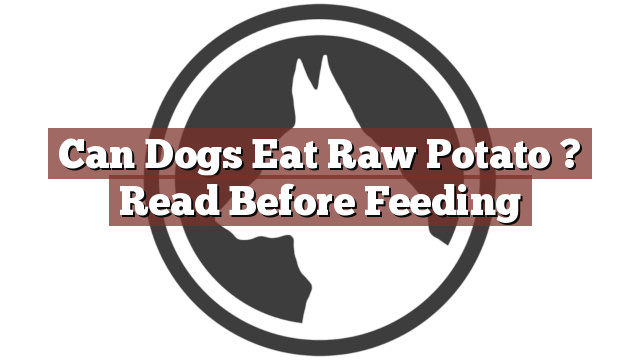Understanding Your Dog’s Dietary Needs
As a responsible pet owner, it is important to understand your dog’s dietary needs. Providing a well-balanced and nutritious diet is crucial for their overall health and well-being. While dogs are primarily carnivorous animals, they can also benefit from certain fruits and vegetables in moderation. However, it is essential to be cautious about what human foods you introduce to your furry friend’s diet.
Can Dogs Eat Raw Potato? Read Before Feeding
Can dogs eat raw potato? This is a common question that many pet owners have. The simple answer is no. Raw potatoes, including the skin, can be harmful to dogs if consumed in large quantities. This is because they contain solanine, a naturally occurring toxic chemical. While solanine is more concentrated in the green parts of the potato, such as the sprouts and the peel, it can still be present in the flesh of the potato. Therefore, it is best to avoid feeding your dog raw potatoes altogether.
Instead of raw potatoes, you can safely incorporate cooked or mashed potatoes into your dog’s diet. However, it is important to remember that moderation is key. Potatoes should only make up a small portion of your dog’s overall diet, and they should be prepared without any seasoning or additives that might be harmful to dogs, such as butter, salt, or garlic.
Pros and Cons of Feeding Raw Potato to Your Dog
Feeding raw potatoes to your dog can have both pros and cons. On the positive side, potatoes are a good source of vitamins and minerals, such as vitamin C and potassium. They also provide dietary fiber, which can aid in digestion. However, it is important to note that dogs have specific dietary requirements that differ from humans. While potatoes can be a healthy addition to a balanced diet for humans, they may not be as beneficial for dogs.
One of the main concerns with feeding raw potatoes to dogs is the presence of solanine. Ingesting large amounts of solanine can lead to digestive upset, including vomiting and diarrhea. In severe cases, it can even cause more serious symptoms, such as tremors, seizures, and difficulty breathing. Therefore, it is best to err on the side of caution and avoid feeding raw potatoes to your furry friend.
In Conclusion: Make Informed Choices for Your Dog’s Health
In conclusion, it is essential to make informed choices when it comes to your dog’s diet. While raw potatoes may be safe for human consumption, they can be potentially harmful to dogs due to the presence of solanine. If you want to incorporate potatoes into your dog’s diet, it is best to cook or mash them without any seasoning or additives. However, it is important to remember that potatoes should only make up a small portion of your dog’s overall diet, and a balanced and nutritious dog food should be the primary source of their nutrition.
Always consult with your veterinarian before making any significant changes to your dog’s diet. Your vet can provide guidance and recommendations based on your dog’s specific needs and health condition. By prioritizing your dog’s health and well-being, you can ensure that they receive the proper nutrition they need to thrive.
Thank you for taking the time to read through our exploration of [page_title]. As every dog lover knows, our furry friends have unique dietary needs and responses, often varying from one canine to another. This is why it's paramount to approach any changes in their diet with caution and knowledge.
Before introducing any new treats or making alterations to your dog's diet based on our insights, it's crucial to consult with a veterinarian about [page_title]. Their expertise ensures that the choices you make are well-suited to your particular pet's health and well-being.
Even seemingly harmless foods can sometimes lead to allergic reactions or digestive issues, which is why monitoring your dog after introducing any new food item is essential.
The content provided here on [page_title] is crafted with care, thorough research, and a genuine love for dogs. Nevertheless, it serves as a general guideline and should not be considered a substitute for professional veterinary advice.
Always prioritize the expert insights of your veterinarian, and remember that the health and happiness of your furry companion come first.
May your journey with your pet continue to be filled with joy, love, and safe culinary adventures. Happy reading, and even happier snacking for your canine friend!

